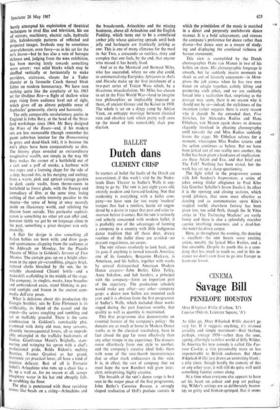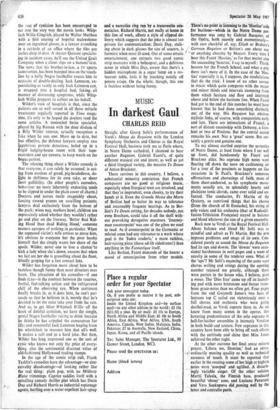CINEMA
Savage Bill
PENELOPE HOUSTON
Meet Whiplash Willie (Carlton, 'U') Caprice (Odeon, Leicester Square, 'A')
As titles go, Meet Whiplash Willie doesn't go very far. If it suggests anything, it's strained joviality and simple merriment—Red Skelton, perhaps, vintage 1950—rather than the sour, ageing, alluringly tasteless world of Billy Wilder. In America his new comedy is called The For- tune Cookie, a title presumably more or less impenetrable to British audiences. But Meet Whiplash Willie just draws an uninviting blank : a pity since, though hardly the comedy of this or any other year, it will still do quite well until something funnier comes along.
At a time when everyone else appears to have set his heart on colour and pop art packag- ing, Wilder's settings are so deliberately beaten- up, so gritty and broken-springed, that it seems the rust of cynicism has been encouraged to eat into the very way the movie looks. Whip- lash Willie Gingrich, played by Walter Matthau with a thin coating of hopeful malevolence over an ingrained gloom, is a lawyer crouching in a rat-hole of an office where the files are inches deep in dust. A shyster Quixote specialis- ing in accident cases, he'll sue the United truit Company when a client slips on a banana skin. The news that his brother-in-law, a TV sports cameraman, has been bumped into on the touch- line by a hefty Negro footballer rouses him to ecstasies of double-dealing. Jack Lemmon, ex- postulating as vainly as only Jack Lemmon can, is strapped into a hospital bed, faking, all manner of distressing symptoms, while Whip- lash Willie prepares to collect on his behalf.
Wilder's view of hospitals is that, since the patients are so well versed in all those miracle treatments regularly reported in Time maga- zine, it's only to be hoped the doctors read the same articles. A monocled Swiss specialist, played by Sig Ruman with the dour disdain of a Billy Wilder veteran, actually recognises a fake when he sees one. More up to date, but less effective, the defence lawyers employ two ipgubrious private detectives, holed up in a frigid lodging-house room with their tape- recorders and spy camera, to keep watch on the bogus patient.
The relaxing thing about a Wilder comedy is that everyone, it can safely be assumed, is act- ing from motives of greed, pig-headedness, de- light in shiftiness for its own sake, or sheer inert gullibility. (In other people's comedies, behaviour no more inherently endearing tends to be slipped in under the plain cover of charm.) Doctors and nurses rustle snappishly about, forcing stewed prunes on unwilling patients; lawyers deal exclusively from the bottom of the pack; wives nag, mothers howl, children are repressively asked whether they wouldn't rather go and play on the freeway. `Better Red Rid- ing Hood than dead Riding Hood,' someone mutters apropos of nothing in particular. When the supposed victim's wife arrives to nurse him, it's obvious to everyone but the poor booby himself that she simply wants her share of the spoils. Wilder, never one to lose a chance-to kick a lady when she's down, ensures that when we last see her she is grovelling about the floor, blindly groping for a lost contact lens.
Wilder has forgotten more about how to be tasteless though funny than most directors ever learn. The attraction of his comedies—if one finds it so—is the contrast between the raucous, fretful, fast-talking action and the refrigerated chill of the observing eye. When sentiment finally breaks in, as it does here, he can't per- suade us that he believes in it, merely that he's decided to let the mice take over from the rats. And so, to get Meet Whiplash Willie off the hook of doleful cynicism, we have the simple, genial Negro footballer taking to drink because he thinks he has crippled the cameraman for life; and remorseful Jack Lemmon leaping from his wheelchair to reassure him that all's well. It makes a soft end to a hard joke. But then, Wilder has long impressed one as the sort of cynic who knows not only the price of every- thing, also the sentimental discount value of old-fashioned Hollywood trading stamps.
In the age of the comic strip cult, Frank Tashlin's comedies have the advantage—or con- ceivably disadvantage—of looking rather like the real thing: plain pop, with no Modesty 'liaise trimmings. Caprice saddles itself with a spiralling comedy thriller plot which has Doris Day and Richard Harris as industrial espionage agents, battling over a water-repellent hair-spray and a narcotics ring run by a transvestite cos- metician. Richard Harris, not really at home in this line of work, affects a style of clipped de- livery which suggests that the joke is almost too private for communication; Doris Day, stalk- ing about in dark glasses the size of saucers, is funniest when most ill-used. Out of some erratic entertainment, one extracts two good comic strip moments with a helicopter, and a delirious scene in which Miss Day, aware that there's a hidden microphone in a sugar lump on a res- taurant table, foils it by lunching noisily off potato crisps. On the whole, though, this one is feckless without being funny.



































 Previous page
Previous page